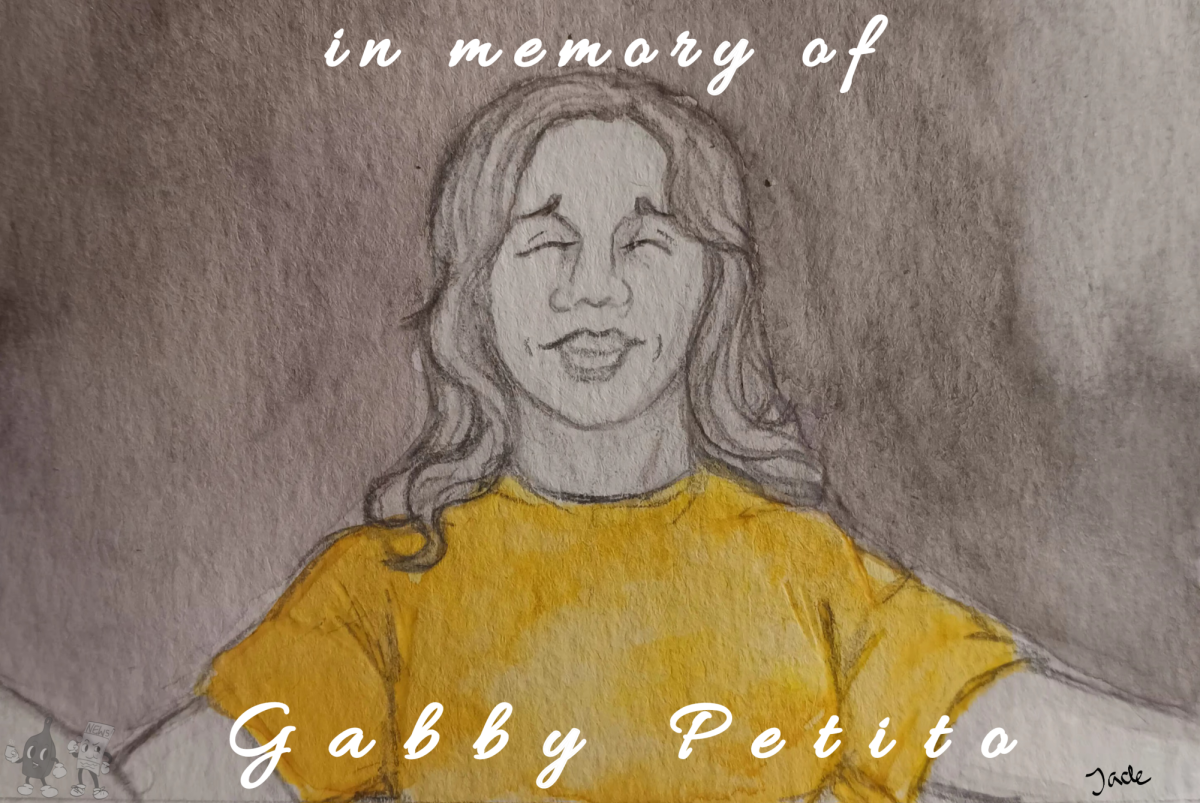True crime is a big source of entertainment for many people nowadays. Documentaries, podcasts, and TV renditions are just a few ways that true crime content is created. Some people think that it’s a good way to get informed, while others think that some cases should be left at rest.
What faces a lot of resentment in the true crime world is social media influencers who cover cases; whether it be a TikTok of them just talking or YouTubers who do their makeup while talking about it. Users on social media spark conversations of whether it’s ethical for someone to be doing their makeup routine while talking about the gory details of a crime.
GABBY PETITO
Gabby Petito was strangled to death by her fiance, Brian Laundrie, in September 2021 after going on a road trip together. The engaged couple bought a van that same year, and in June, they went on the road to travel the world together. While on the road trip, Petito was inspired by van-life influencers, so she started a blog and YouTube channel to broadcast their trip.
On August 12, 2021, the cops were called for a “man was attacking a girl in a van driving by”. Time, a news site, describes the interaction with the couple, and the cops concluded with the idea that Petito was overreacting, while they laughed with Laundrie. Other than separating the couple for the night, the cops took no other action.
Petito was declared as missing in late August, then within the next month, her remains were found in Wyoming Bridgerton National Forest. Shortly after her body was discovered, Laundrie was found in Florida, where his parents live, with only the van. Later in October, Laundrie was found dead by suicide.
By January 2022, the case was closed after finding Laundrie’s notebook that confessed to the murder of Gabby Petito.
On February 17, 2025, Netflix released a documentary about Petito called American Murder: Gabby Petito, a three part series. Through this documentary, they compiled found footage of the couple that Petito filmed for her blog. Viewers could vividly see the dynamic of their relationship and the off-putting signs that Laundrie gave.
This docu-series brings awareness to the faulty bliss that social media tends to bring. It brought recognition to her family and the heartbreaking reality that Gabby Petito lived.
Since her passing, her father, Joseph Petito, has been trying to bring awareness to “Missing White Woman Syndrome”, this past year. This phenomenon is referencing how when a white woman goes missing, it flies through social media and quickly gets spoken about, while minority groups get the opposite reaction to going missing. Instead of articles flooding the media in hopes to find them, these minority groups get forgotten and not talked about. He recognized how much support his family received for his daughter, but how minorities that go missing don’t get the same treatment. Joseph Petito has focused on collaborating on a TV series called Faces of the Missing, that talks about marginalized victims that got ignored.
Despite Gabby Petito’s case being solved at the beginning of 2022, the Netflix series has brought limelight to her once again. There will always be conspiracy theories and information that seems to be missing, but some documentaries seem to bring justice better than others.
DAHMER
In 2022, Netflix released a reenactment series of Jeffrey Dahmer’s story, DAHMER. Starring Evan Peters, this series caused a lot of controversy. One of the main issues was the lack of respect for the victims’ families.
The series was very raw and explicit about the crimes Dahmer committed – the writers did not ask the real-life families of the victims for consent to recreate their experiences. According to the BBC, many of them came out to express their discomfort and frustration at the series’ existence. Another issue that it stirred up is the morality of watching true crime for pleasure. Many viewers who watched DAHMER struggled with the glorification of the serial killer that the show presented.
A gray area was created while trying to bring justice for victims and awareness to cases, versus glorifying the villain. When creating a series about a serial killer, it is important to respect the victims and make apparent that the crimes are corrupt. Specifically in DAHMER, it goes over his background and relationship with parents and school growing up. Due to his poor childhood, users on social media would discuss how they felt bad for Dahmer and almost try to excuse his actions.
Instead of excusing, the show should be done in a way to inform and bring attention to concerning signs of these behaviors. DAHMER did not particularly do this in an effective way. By showing what Dahmer experienced, while not giving background to the victims, it makes it easier for the audience to sympathize for him at the expense of the victims that they did not personally connect with through the show.
SOCIAL MEDIA INFLUENCERS COVERING TRUE CRIME
There are many forms of true crime on social media. There are podcasters who inform and discuss the information of the case, like the popularly known podcast, Crime Junkies, hosted by Ashley Flowers. On TikTok and YouTube, however, there seems to be two specific types of covering. The first one is talking to the camera and giving facts about the case, with the goal to report and inform. Some creators that do this are @mshelly on TikTok and Kendall Rae on YouTube.
On the other side of the spectrum is doing an activity like makeup, skin care, or other varieties of beauty while discussing cases. This is seen a lot on TikTok, due to the short form video, it grabs the attention of the viewer quicker. User @mesmegmegitsmeg on TikTok and Bailey Sarian on YouTube participate in this. Despite the popularity of these videos, it has become apparent in the last few years that talking about a makeup routine in between talking about murder victims seems unethical.
A lot of the time this kind of content feels disingenuous towards the real events and people that lived through it, especially when done alongside makeup.
CONCLUSION
Many people have their own opinions about investing time into true crime, whether they feel scared and uncomfortable while listening, or finding it interesting and wanting to learn more. Unless creators or directors talk directly to victims or families, it will seem a little off-putting to talk about it.
No matter what true crime content will be created, it’s up to viewers to decide if they will talk about it respectfully and ethically, or not.





